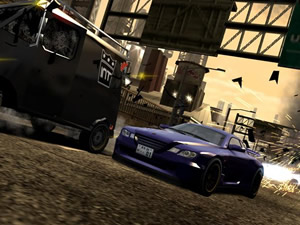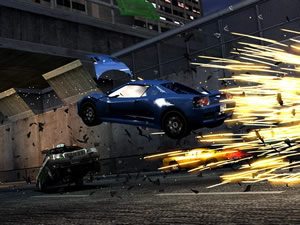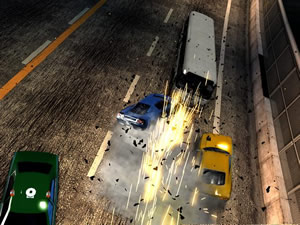Revenge of the shift.
Shortly after arriving in California, I started to suffer from road rage. What began as merely a rash of bad feelings has escalated into an open sore of misanthropic, vehicular hate.
It wasn’t always this way. For five years I managed to dodge every weaving old lady, cell-phone addict and preoccupied soccer mom trying to end my days on the asphalt. I was a bastion of cordial driving. Then, I failed to dodge the Mercedes S-Class that pummeled, at thirty miles per hour, into the back of my nearing-vintage Oldsmobile while I was waiting at a stop light.
Sure sure, I didn’t throw the driver’s yappy dog into traffic. But then again, the other driver didn’t have a yappy dog. Instead, I’ve been left to wander the land by bus, my only companion a mind filled with vengeful, fuming anger.
Luckily, I found a helluva therapist in EA’s Burnout Revenge. The much-anticipated follow-up to last year’s Burnout 3: Takedown has been like a big brother to me, teaching me to harness my inner road rage and unleash it digitally. That should come as no surprise, though, since it follows in the tire tracks of one of the best racing games ever.
The Burnout series has effectively retooled the standard race formula into a smashing example of arcade driving. Over-the-top physics, deep gameplay, and a variety of game modes separated Takedown from the rest of the pack. Clearly EA knew that we like our games like we like our women – gorgeous, huge, and violent.
Thankfully, Revenge retains most of the basic elements that made Takedown such a wonderfully fresh racer. Back again is the turbo boost meter that charges up with reckless driving and "takedowns," EA’s word for running an opponent off the road, into a semi, or into a variety of other accidents. By driving on the wrong side of the road, missing traffic by hairsbreadths, or making toast out of your enemies, you build up boost. Also returning is the wide variety of game types, including Road Rage (a race in which you must takedown a certain number of opponents in a limited time) and Elimination (in which the last place car is eliminated every few minutes). Last year’s Crash events have also returned, this time pared down to simply driving your car into traffic and watching the mayhem unfold.
So in many ways, Revenge is the same beast as Takedown. There are, however, two major additions that notably change the tone and action of the game.
The first is the ability to "traffic check" same-way traffic. By hitting cars, vans, and pickup trucks from behind, you can launch them into the air and across the track. Besides building boost, the careening wreckage becomes a useful weapon. Sail a Civic into your enemy and he’s out like a Pinto with no brake lights.
Whether or not this small but significant change is for the better depends largely on the kind of gamer you are. Arcadey as it was, Takedown emphasized dodging and precise navigation. Revenge, however, rewards smashmouth driving. Hurtling vehicles at your enemies feels a bit like dropping banana peels from a Mario Kart. While the "traffic checks" certainly amplify the battling aspect of Burnout, they also reduce the attention to driving and racing. Why weave through traffic when you can burrow through it instead?
 The other significant addition is the re-mapping of the tracks to include hundreds of alternate paths. No longer are you confined to a single route, as you can steer your vehicle through parking garages, over impromptu ramps, into warehouse districts, over the hill, through the wood, and even by your proverbial grandmother’s house. Indeed, there are so many alternate routes that it is often difficult to know which, if any, is the intended route. Some alternates are shortcuts, others launch you off breathtaking ramps, and a few just land you in a maze of obstacles.
The other significant addition is the re-mapping of the tracks to include hundreds of alternate paths. No longer are you confined to a single route, as you can steer your vehicle through parking garages, over impromptu ramps, into warehouse districts, over the hill, through the wood, and even by your proverbial grandmother’s house. Indeed, there are so many alternate routes that it is often difficult to know which, if any, is the intended route. Some alternates are shortcuts, others launch you off breathtaking ramps, and a few just land you in a maze of obstacles.
While the introduction of a breathtaking vertical game is a no-brainer (catching air also subjects you to wind conditions and thrilling screen blurring), the mayhem of the tracks can leave you without a brain. You never really feel in control when flying down the tracks, under buildings, and through aqueducts. As the game progresses, you begin to learn where the useful shortcuts are, but the awesome speed of the game can be a bit frustrating when you keep missing exits, or worse, totaling your car into the face of a brick wall next to an exit. Probably as many people will like the alternate routes as those who will hate them; I was a bit dismayed that the racing and precision were sacrificed for nearly out of control driving and more than a few quarts of chance.
Few will be displeased by the online options. You can obviously race against opponents, play a version of Road Rage in which one team chases another, and compare scores in the Crash events. The alternate route scheme adds a lot to the multiplayer game, as cars can hide and reemerge suddenly in front of a trail of burning wreckage. We still wonder why a regular Road Rage mode isn’t included in the online package – why limit the potential for destruction?
There are a few other omissions that still haven’t been remedied, either. There is still no replay, which means you can never recapture the magic of hurtling through the air off a ramp and landing on your hapless opponent’s unfortunate car. Additionally, the specs for the available cars are still limited to just weight and speed. For my money, I want to know the difference between the Limited M-type that goes 180 mph and the M-type DX that also goes 180 mph. It does seem that the cars have distinct personalities, but the game should just tell you that one handles better or accelerates better as it would make the choice between cars something more than a cosmetic afterthought.
 But for every oversight comes an equally interesting addition. One is the introduction of "crashbreakers." When you wreck, not only can you nudge your flaming carcass into the path of your opponents, but you can explode it with the touch of a button. The size of your explosion is governed by the amount of boost you had upon wrecking, making it a bit risky, but can be well worth it if you nail a rival to keep him from taking the lead. Here’s to unnecessary pyromania!
But for every oversight comes an equally interesting addition. One is the introduction of "crashbreakers." When you wreck, not only can you nudge your flaming carcass into the path of your opponents, but you can explode it with the touch of a button. The size of your explosion is governed by the amount of boost you had upon wrecking, making it a bit risky, but can be well worth it if you nail a rival to keep him from taking the lead. Here’s to unnecessary pyromania!
Both the PS2 and Xbox versions are identical in terms of gameplay and modes. The Xbox looks just a tad smoother and enjoys shorter loading times, but it’s not a big upgrade. Perhaps the only bummer is that the controllers are not customizable, which is a shame for the PS2 version since the brakes are mapped to the Square button instead of the left shoulder button like the Xbox.
Still, Revenge is one of the prettiest racing games we’ve seen for either system. The level of detail in the maps and the blurring effects are both improvements over last year’s version. And that’s saying a lot, because Takedown was a serious looker in its own right.
As good as it is on the eyes, Revenge is, like its predecessor, hard on the ears. EA has really warmed up to the pop-punk scene, and the result is that many of their best games are saddled with similarly whiny, overly self-important vanilla rock. If you have an Xbox, you can use your own music; if you don’t, you might as well learn to love the trendiness.
So is Burnout Revenge better than its illustrious forbear? The controls are tighter, the look is more detailed, there are more vehicles and thousands of little tweaks, so in many ways, sure. But while some will dig the new chaotic maps and aggressive traffic-checking, others may be turned off by the loss of precision and the dependence upon blind chance. Either way, it’s an impressive game, one with a proper understanding of the benefits of road rage.
-
Improved Takedown formula
-
Stunning visuals
-
Catching air, dude
-
Still no replay
-
No car specs
-
Painfully trendy music







